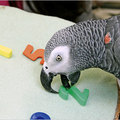A step in the right direction
| |
 | |
THE system of checks and balances deemed so vital to good government does not work so well in the realm of corporate governance. The recent troubles at Airbus and its parent company, EADS, provide a fine example of the industrial bother of loading evenly the scales of corporate power for the sake of politics. So a decision on Monday July 16th to reshape the management of the European Aerospace giant should be greeted with some good cheer. Nicolas Sarkozy, France’s new president, was in expansive mood. He emerged from a meeting in Toulouse, at Airbus’s headquarters, with Angela Merkel, his German counterpart, proclaiming it a “great day for the Franco-German axis”.
Although the deal maintains a rough balance of power at the top of the two firms it does away with a cumbersome dual-management structure at EADS. Instead of two chairmen and chief executives representing the countries that control the bulk of shares in EADS the firm will now make do with one of each. Rüdiger Grube, a German, will become chairman while Louis Gallois, a Frenchman, will remain as chief executive but without a German shadow. His former cohabitee, Thomas Enders, will become boss of Airbus while France’s Fabrice Brégier will become the jetmaker’s chief operating officer. EADS will also get more independent board members.
This will bring some clarity to the chain of command, with luck improving the running of EADS and Airbus. Last month an earnest report from the French parliament pointed out the obvious: infighting had hampered Airbus in its efforts to compete with Boeing, its American arch-rival. As a measure of the turmoil, last year EADS and Airbus said goodbye to three chief executives. The report singled out rivalry between two French EADS bosses, Phillippe Camus and Noël Forgeard, as an unwanted distraction as the firm struggled to overcome problems with the A380, its superjumbo. Delays to delivery of the new plane pushed EADS into losses last year.
The losses will continue this year, even though demand for passenger jets is booming. Despite unveiling an extraordinary armada of orders and commitments for over 600 planes at the Paris Air Show last month Airbus still faces an uncertain future. Mr Sarkozy’s new-boy enthusiasm and Ms Merkel’s diplomatic skills may be lauded for producing an agreement to rebalance the management. Elsewhere much remains the same. The French government owns 15% of EADS, and Lagardère, a French conglomerate, owns 7.5%; DaimlerChrysler and German banks hold 22.5%. The governments have ensured that the split remains even to ensure that jobs are apportioned equally.
Now job losses are to be shared out equally too. The firm’s unions are unhappy that, despite the bulging order book, Airbus is in the midst of a cost-cutting effort that will see 10,000 workers depart and the sale of six factories to industrial partners in the hope of saving €2 billion a year. But Airbus is caught in a currency trap. Planes are sold for cheap dollars while Airbus’s expenses are in pricey euros. The firm reckons that every €0.10 that the euro falls against the dollar costs it €1 billion.
The revamped management team might have better luck with efforts to ape Boeing. But outsourcing jobs to countries beyond the euro-area and allying with more risk-sharing partners will be tricky even for the slimmed down executive team if political concerns must be considered. Worryingly, Mr Sarkozy’s electioneering included a promise to defend French industry vigorously. His free-market instincts are tempered by an interventionist streak that might make it hard to accept further cuts even if Ms Merkel were willing to see Germans sharing the pain.
Fixing the bloated management should give cause for optimism. Mr Sarkozy has indicated that at some point the French government would be prepared to sell its stake in EADS. If the firms were eventually freed from their political shackles, that would be cause for considerable celebration.



